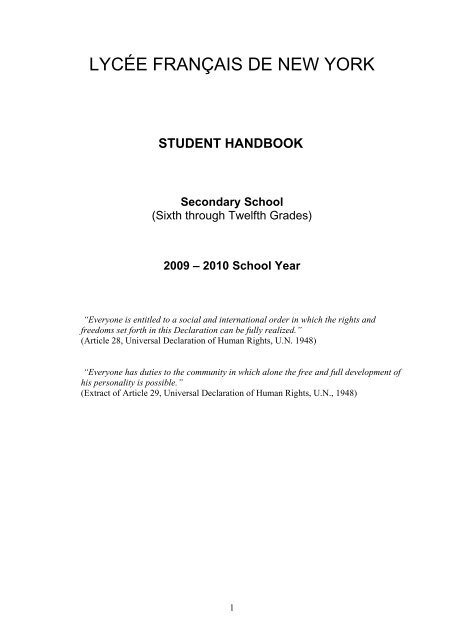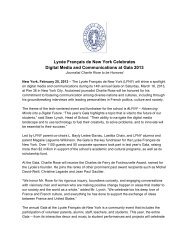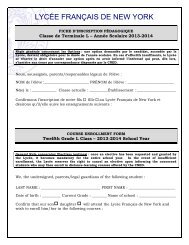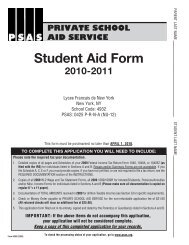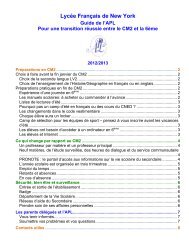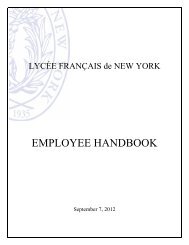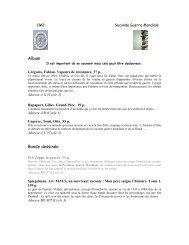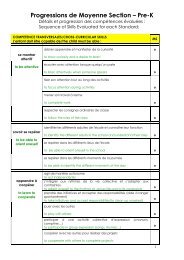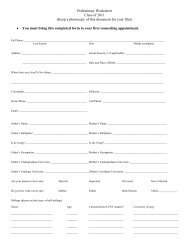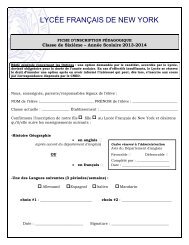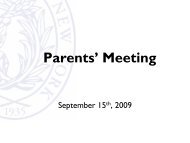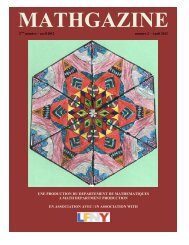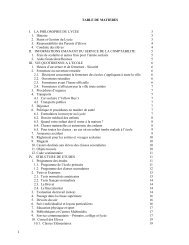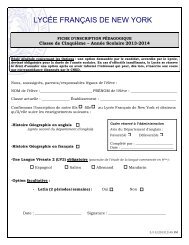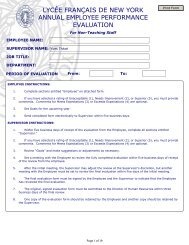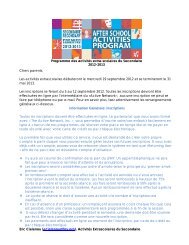STUDENT HANDBOOK Secondary School - Lycée Français de New ...
STUDENT HANDBOOK Secondary School - Lycée Français de New ...
STUDENT HANDBOOK Secondary School - Lycée Français de New ...
You also want an ePaper? Increase the reach of your titles
YUMPU automatically turns print PDFs into web optimized ePapers that Google loves.
LYCÉE FRANÇAIS DE NEW YORK<br />
<strong>STUDENT</strong> <strong>HANDBOOK</strong><br />
<strong>Secondary</strong> <strong>School</strong><br />
(Sixth through Twelfth Gra<strong>de</strong>s)<br />
2009 – 2010 <strong>School</strong> Year<br />
“Everyone is entitled to a social and international or<strong>de</strong>r in which the rights and<br />
freedoms set forth in this Declaration can be fully realized.”<br />
(Article 28, Universal Declaration of Human Rights, U.N. 1948)<br />
“Everyone has duties to the community in which alone the free and full <strong>de</strong>velopment of<br />
his personality is possible.”<br />
(Extract of Article 29, Universal Declaration of Human Rights, U.N., 1948)<br />
1
This page is to be signed by the parents and the stu<strong>de</strong>nt on or before the first day<br />
of school.<br />
Stu<strong>de</strong>nt’s Name: ____________________________ Class:______<br />
The registration of a stu<strong>de</strong>nt at the Lycée Français <strong>de</strong> <strong>New</strong> York implies the acceptance<br />
by the parents or legal guardians of all the clauses of the school regulations, as well as a<br />
commitment to comply with them and to have their child respect these terms. The Lycée<br />
Français reserves the right not to admit to class any stu<strong>de</strong>nt in breach of the regulations<br />
summarized in this document.<br />
Enrollment carries a level of trust, and a stu<strong>de</strong>nt may be called upon at any moment by an<br />
adult to help resolve an inci<strong>de</strong>nt.<br />
Read and accepted by:<br />
Stu<strong>de</strong>nt’s signature<br />
Date<br />
Parents’/Guardians’ signature<br />
Date<br />
For stu<strong>de</strong>nts of 4e-Tle only:<br />
We the un<strong>de</strong>rsigned,<br />
________________________<br />
parents/legal guardians of<br />
enrolled in class , hereby authorize our son/daughter to leave the Lycée Français<br />
<strong>de</strong> <strong>New</strong> York during those times of day when she/he may have no classes and according<br />
to the terms specified in this handbook (at lunch time, or in the event of a teacher’s<br />
absence confirmed by the <strong>School</strong> at the end of a school day); we thereby absolve the<br />
Lycée of all responsibility for our son/daughter during these periods of absence.<br />
________________________________________________<br />
Parents’/Guardians’ signature / Date<br />
2
Preamble<br />
The current school regulations <strong>de</strong>fine the governing rules and the co<strong>de</strong> of conduct in<br />
effect at the Lycée Français <strong>de</strong> <strong>New</strong> York for the 2009-2010 aca<strong>de</strong>mic year. Since this<br />
document may be revised each year or contain new information compared to the<br />
preceding year, all parents or legal guardians of stu<strong>de</strong>nts are asked to take careful note of<br />
this document, and to assist the Lycée’s administration in making it respected and in<br />
applying all its terms. The objective of many of its proposals is to assure the smooth<br />
functioning of the school day and school life, to guarantee the safety of the stu<strong>de</strong>nts, and<br />
to keep families informed. It is <strong>de</strong>signed, therefore, to respond to our most legitimate<br />
concerns.<br />
The Lycée is a place of work where each stu<strong>de</strong>nt must learn to become an adult and a<br />
citizen. The school regulations’ goals are to help the organization of this work, to<br />
facilitate civic consciousness in a <strong>de</strong>mocratic and secular spirit, to allow teaching that is<br />
open to all aspects of life, and to <strong>de</strong>velop the learning of self-discipline through the<br />
acquisition of a sense of responsibility.<br />
These school regulations are to be respected throughout the campus and its<br />
surrounding vicinity.<br />
1. GENERAL RULES OF CONDUCT<br />
During the school year, if a stu<strong>de</strong>nt discredits the school by his/her behavior on or off<br />
campus, the school will inform the stu<strong>de</strong>nt’s parents of the inci<strong>de</strong>nt and reserves the right<br />
to take the appropriate disciplinary measures or sanctions.<br />
1.1 Stu<strong>de</strong>nt Conduct<br />
The principle of respecting the freedom of every individual requires the strictest<br />
observation of the fundamental rules of neutral and secular behavior of the Lycée<br />
and all of its members: one must avoid anything that could lend offense to the<br />
convictions or sentiments of the stu<strong>de</strong>nts or their families, either through<br />
insensitive words or acts, outrageous outfits, or through the introduction,<br />
exposition and distribution of documents that might be offensive in either<br />
language or nature.<br />
Every secondary stu<strong>de</strong>nt who enters or leaves the premises must badge in and out<br />
of the 75 th street lobby exclusively. Stu<strong>de</strong>nts without badges will remain within<br />
the school and will not be allowed to leave the premises until dismissal time. The<br />
cost to replace a lost badge is $20.00.<br />
The use of mp3 players, I-Pods, cell phones, and beepers, as well as the use of all<br />
electronic communication <strong>de</strong>vices, is authorized only in the school lobby, the<br />
stu<strong>de</strong>nt lounges or the cafeteria. Everywhere else, all apparatus must be turned<br />
off or kept in “silent” mo<strong>de</strong> (and this does not mean vibrate mo<strong>de</strong>), and put<br />
away.<br />
The use of chewing gum is forbid<strong>de</strong>n in the Lycée. This inclu<strong>de</strong>s all classrooms<br />
and common areas such as the drive-thru, cafeteria, lobby, etc.<br />
3
1.1.1 In Class<br />
Beverages and food (with the exception of water bottles) are also not<br />
permitted in class, except during exams and assignments of over two<br />
hours’ duration.<br />
1.1.2 In Study Hall<br />
The study hall is place of quiet work. Study Hall may be held in the<br />
library, following the authorization of the Dean’s assistants and the<br />
librarian. Upon arrival in the library, the stu<strong>de</strong>nt must sign in and remain<br />
in the library for the duration of the study hall.<br />
Starting in the 2 nd trimester, and with the approval of the Conseil <strong>de</strong><br />
Classe, 9 th gra<strong>de</strong>rs may be in the CDI, Gallery, or study room during study<br />
hall hours as they prefer, without adult supervision. This privilege may be<br />
granted or refused according to the aca<strong>de</strong>mic and behavioral profile of the<br />
gra<strong>de</strong> as a whole.<br />
1.1.3 Between Classes<br />
The period between classes is a time allotted for movement from one class<br />
to another or for a “break” between classes. Any stu<strong>de</strong>nt arriving for class<br />
after the second bell has signaled the beginning of class is consi<strong>de</strong>red late.<br />
The “break” between classes is not a time during which stu<strong>de</strong>nts may<br />
leave the building (unless they have a free period directly before or after<br />
the break in the afternoon). Thus, specifically, stu<strong>de</strong>nts may not leave the<br />
building before the start of third period class, nor may they leave at the<br />
start of the afternoon break intending to return at the end of the break.<br />
An exception may be granted for the Terminales, who may be allowed to<br />
leave the building one period earlier, but only after the first trimester and<br />
with the approval of the Conseil <strong>de</strong> Classe.<br />
1.1.4 Within the <strong>School</strong> Perimeter and while on Field Trips<br />
When off the school premises, the stu<strong>de</strong>nts of the Lycée must not disturb<br />
the resi<strong>de</strong>nts of neighboring buildings by blocking their entrances or by<br />
leaving their <strong>de</strong>bris in public spaces or in front of private resi<strong>de</strong>nces.<br />
Furthermore, for safety reasons skateboards are not permitted neither<br />
insi<strong>de</strong> the Lycée nor within the school perimeter (the perimeter extends<br />
from 73 rd Street to 78 th Street and from Second Avenue to the East River).<br />
1.2 In-<strong>School</strong> Conduct<br />
Each stu<strong>de</strong>nt is required to have all the materials requested by the teacher for<br />
every class.<br />
1.2.1 Respecting Deadlines<br />
Stu<strong>de</strong>nts must submit assignments on time, at the <strong>de</strong>signated hour, and<br />
directly into the teacher’s own hands. If necessary, and only after an<br />
explicit agreement is reached between teacher and stu<strong>de</strong>nt, the teacher can<br />
accept work outsi<strong>de</strong> of class time or even once he has left the building;<br />
4
this applies most often to internet use.<br />
After the assigned class period, two points will be taken off the assignment<br />
for each day it is late, with the gra<strong>de</strong> of zero being given at the end of<br />
three days. In the case when an assignment due on a Friday, if the<br />
assignment is turned in on Monday, 4 points will be <strong>de</strong>ducted; if it is<br />
turned in on Tuesday, it will receive a zero. Once the <strong>de</strong>adline has passed,<br />
the teacher reserves the right to insist that the stu<strong>de</strong>nt submit the<br />
assignment even though the stu<strong>de</strong>nt has been given a zero.<br />
1.2.2 Cheating<br />
All cheating or attempts at cheating will be punished with the gra<strong>de</strong> of<br />
zero and reported to the school’s administration. The teacher concerned<br />
will notify the parents, and the stu<strong>de</strong>nt may, at the discretion of the<br />
Conseil <strong>de</strong> Classe, be barred from obtaining any honors on that trimester’s<br />
report card. In the event of a repeated episo<strong>de</strong>, the parents will be asked to<br />
meet with a representative of the Lycée. “Cheating” inclu<strong>de</strong>s allowing<br />
one’s work to be used, in whole or in part, by another stu<strong>de</strong>nt who has<br />
been asked to submit individual work. If a stu<strong>de</strong>nt allows a friend to copy<br />
i<strong>de</strong>as or words for an essay, or to copy answers to a test, both stu<strong>de</strong>nts<br />
have committed aca<strong>de</strong>mic dishonesty.<br />
1.2.3 Use of a Calculator<br />
During an exam or a class, the teacher informs the stu<strong>de</strong>nts whether or not<br />
they are authorized to use a calculator.<br />
1.2.4 Use of a Handheld (Pocket) Computer<br />
During class time, handheld computers may only be used as calendars<br />
during the time set asi<strong>de</strong> for noting homework assignments, due dates, and<br />
upcoming tests.<br />
1.2.5 Use of laptops<br />
The individual use of laptops is a way to empower stu<strong>de</strong>nts and is in no<br />
way <strong>de</strong>stined to diminish the vital role of the teacher. Laptops allow<br />
stu<strong>de</strong>nts to learn at their full potential and to prepare them for the real<br />
world of college and the workplace. Laptops encourage stu<strong>de</strong>nts to solve<br />
problems and think critically by stimulating their analytical thinking.<br />
General Gui<strong>de</strong>lines<br />
Stu<strong>de</strong>nts may bring personal laptop computers to school only if they<br />
comply with these rules:<br />
1. Stu<strong>de</strong>nts will have access to the forms of electronic media and<br />
communication approved by the Lycee.<br />
2. Stu<strong>de</strong>nts are responsible for the appropriate use of technology resources<br />
of the school. Please refer to the stu<strong>de</strong>nt handbook.<br />
5
3. Access to the Lycée Français <strong>de</strong> <strong>New</strong> York technology resources is a<br />
privilege and not a right.<br />
4. Stu<strong>de</strong>nts are responsible for their own personal property within the<br />
school which inclu<strong>de</strong>s, but is not limited to, electronic <strong>de</strong>vices and<br />
equipment. The school assumes no liability for the loss or damage of these<br />
items.<br />
5. The use of computers for any activity in class, including the use of the<br />
wireless network, is at the discretion of the teacher or the learning<br />
specialist.<br />
6. Sound on laptops must be muted at all times unless permission is<br />
obtained from the teacher for instructional purposes.<br />
7. In the case of any abuse or any rule violation, sanctions will be applied.<br />
Furthermore, any illegal activity may be reported to the appropriate<br />
authorities.<br />
1.2.6 Plagiarism/Intellectual Honesty<br />
Our experience with the stu<strong>de</strong>nts of the Lycée proves that they are honest and<br />
serious, and that they do their best work to succeed! However, candor obliges us<br />
to remark that stu<strong>de</strong>nts have copied the work of others and presented it as their<br />
own. In or<strong>de</strong>r to clarify our position on this subject, and in or<strong>de</strong>r to encourage<br />
communication with stu<strong>de</strong>nts, we offer the following commentary:<br />
Plagiarism means using another person’s work and trying to pass it off as one’s<br />
own. This inclu<strong>de</strong>s collaborative efforts when individual work is required. As<br />
noted above, when one stu<strong>de</strong>nt copies the work of another, both are guilty of<br />
aca<strong>de</strong>mic dishonesty. Aca<strong>de</strong>mic dishonesty distorts the “raison d’être” of the<br />
school, which is to offer our stu<strong>de</strong>nts an education in an atmosphere that<br />
encourages the <strong>de</strong>sire for learning, honest intellectual pursuit, and shared respect.<br />
Acts of plagiarism <strong>de</strong>mean the honest en<strong>de</strong>avors of others and shake the necessary<br />
trust between teachers and stu<strong>de</strong>nts, as well as among stu<strong>de</strong>nts themselves. The<br />
flagrant recopying of another’s work and the inappropriate sharing of information<br />
concerning tests and quizzes are consi<strong>de</strong>red serious offences by the school, and<br />
are subject to severe punishments. Another potential source of plagiarism may<br />
come from the Internet. Submitting essays or papers downloa<strong>de</strong>d from the<br />
Internet is expressly forbid<strong>de</strong>n without appropriate citation.<br />
In teaching written expression, the Lycée encourages its stu<strong>de</strong>nts to be creative<br />
and to find their own ways of organizing and expressing their i<strong>de</strong>as. Written<br />
expression is a tool for learning, and an approach for reflection; to learn writing is<br />
an act of intellectual <strong>de</strong>velopment. To <strong>de</strong>pend on another’s work, to recopy the<br />
main i<strong>de</strong>as of another person’s essay, or to <strong>de</strong>pend on someone else for the<br />
organization of an essay constitutes actions which prevent the stu<strong>de</strong>nt from<br />
<strong>de</strong>veloping his or her own distinct intellectual capabilities. Stu<strong>de</strong>nts must not<br />
utilize resources without citing them; they must correctly quote all critical<br />
sources; and they must not reuse their own previous works without explicit<br />
permission. Stu<strong>de</strong>nts who have any doubts concerning these matters should<br />
discuss them with their teachers.<br />
6
Teachers will discuss the procedures with their classes for use and documentation<br />
of secondary sources in essays, research projects, and other works of written<br />
expression. All stu<strong>de</strong>nts will receive a manual or instructions from teachers on the<br />
means to avoid plagiarism. Once these instructions are given to the stu<strong>de</strong>nts, they<br />
will be held responsible for their actions. Neither ignorance, haste, indifference,<br />
nor the pressure to hand in assignments is an acceptable excuse to justify<br />
aca<strong>de</strong>mic dishonesty.<br />
1.2.6.1 Plagiarism consequences<br />
During the first week of school, every homeroom teacher will explain the<br />
<strong>de</strong>finition of plagiarism to his or her stu<strong>de</strong>nts. Teachers will illustrate the concept<br />
with different specific examples showing stu<strong>de</strong>nts the variety of ways it occurs.<br />
The <strong>School</strong>’s policy in the handbook must be read to the stu<strong>de</strong>nts, and the<br />
consequences of plagiarism clearly explained. Throughout the school year<br />
teachers must revisit on a regular basis the school policy on plagiarism. If a<br />
teacher suspects a stu<strong>de</strong>nt of plagiarism, she or he must immediately discuss their<br />
suspicion with the stu<strong>de</strong>nt. (In cases where one stu<strong>de</strong>nt copies another’s work, in<br />
whole or in part, plagiarism is consi<strong>de</strong>red proven.)<br />
A. If a stu<strong>de</strong>nt admits to having done so, then the following consequences<br />
occur:<br />
For 6ème through 3ème:<br />
<br />
<br />
<br />
In case of a first offense: a warning will be given, the paper re-written with five<br />
points off the gra<strong>de</strong>, and the CPE, the stu<strong>de</strong>nt’s parents and the homeroom teacher<br />
will be notified by the teacher involved.<br />
In case of a second offense: a zero will be given and the paper re-written but no<br />
gra<strong>de</strong> will be given. In addition, the stu<strong>de</strong>nt’s parents are called; the PP<br />
(homeroom teacher), Headmaster, Assistant Headmaster, and the CPE are<br />
notified; and a <strong>de</strong>tention is given.<br />
In case of a third offense, the stu<strong>de</strong>nt will be sanctioned at the discretion of the<br />
Headmaster.<br />
For 2n<strong>de</strong> through Terminale:<br />
<br />
<br />
In case of a first offense during the year: the stu<strong>de</strong>nt will receive a zero, and the<br />
work must be re-written with no gra<strong>de</strong> given; the stu<strong>de</strong>nt’s parents are called; the<br />
PP (homeroom teacher), Headmaster, Assistant Headmaster, the CPE, and the<br />
College Counselor are notified; and a <strong>de</strong>tention is given. If the plagiarism is on a<br />
research paper, no re-write will be allowed.<br />
In case of a second offense during the year: the stu<strong>de</strong>nt will be sanctioned at the<br />
discretion of the Headmaster. Please note: all school suspensions that occur in<br />
high school are reported to colleges on the college application forms. If the<br />
plagiarism occurs after college applications have been filed, the colleges will be<br />
notified of the suspension.<br />
7
B. If a stu<strong>de</strong>nt refuses to admit to plagiarism, then the following<br />
consequences occur:<br />
The Lycée will investigate the case, possibly submitting the paper to<br />
Turnitin.com. If the paper is cleared of charges of plagiarism, then apologies will<br />
be given to the stu<strong>de</strong>nt. If the paper is found to be plagiarized, then the following<br />
applies:<br />
For 6ème through 3ème:<br />
• A zero will be given and the paper re-written but no gra<strong>de</strong> will be given.<br />
In addition, the stu<strong>de</strong>nt’s parents are called; the PP (homeroom teacher),<br />
Headmaster, Assistant Headmaster, and the CPE are notified; and a <strong>de</strong>tention is<br />
given.<br />
For 2n<strong>de</strong> through Terminale:<br />
• The stu<strong>de</strong>nt will be sanctioned at the discretion of the Headmaster. Please<br />
note: all school suspensions that occur in high school are reported to colleges on<br />
the college application forms. If the plagiarism occurs after college applications<br />
have been filed, the colleges will be notified of the suspension.<br />
1.2.7 Tests of Knowledge<br />
Assessment is <strong>de</strong>signed to measure the knowledge acquired by stu<strong>de</strong>nts and is a<br />
contract of sorts between a teacher and a class: un<strong>de</strong>r no circumstance can assessment<br />
be used as a way of punishing behavior or attitu<strong>de</strong>. The test of knowledge is<br />
accomplished by frequent oral and written tests, homework, gra<strong>de</strong>d in-class<br />
assignments, exposés and reports based on class exercises. These gra<strong>de</strong>s are recor<strong>de</strong>d in<br />
the stu<strong>de</strong>nt’s Progress Report, which is sent home on specific dates set at the beginning<br />
of the year. For each trimester, the average of these gra<strong>de</strong>s is noted in the Trimester<br />
Report Card un<strong>de</strong>r the heading, “Note <strong>de</strong> l’élève.” This gra<strong>de</strong> allows the stu<strong>de</strong>nt’s<br />
aca<strong>de</strong>mic progress to be evaluated throughout the school year.<br />
1.2.8 Organization of work load<br />
In or<strong>de</strong>r to help stu<strong>de</strong>nts plan out and organized their work load, it is recommen<strong>de</strong>d that<br />
stu<strong>de</strong>nts not have more than two tests over one hour in length on any given day. In the<br />
case such a situation arises, the class <strong>de</strong>legates should inform the teacher who can, to<br />
the extent that it is possible, make the necessary changes.<br />
1.2.9 Compositions and Practice Exams<br />
In the classes of Troisième to Terminale, a series of exams in all required subjects is<br />
organized for the stu<strong>de</strong>nts. These compositions enable stu<strong>de</strong>nts to evaluate their work<br />
capabilities in similar performance conditions to those they will face in the national<br />
exams. The gra<strong>de</strong>s obtained on the compositions and practice exams will count in the<br />
calculation of the trimester average. A composition or practice exam may only be<br />
missed with a written note from a physician or health care professional; otherwise, a<br />
gra<strong>de</strong> of zero will be given. Parents may not generally excuse children from such exams<br />
due to illness. (Of course, in serious and highly extraordinary situations such as a fire or<br />
<strong>de</strong>ath in the family, the school will try to accommodate stu<strong>de</strong>nts.) Stu<strong>de</strong>nts who arrive<br />
late to a Composition or mock exam will be admitted at the discretion of the proctor<br />
and may not be allowed to sit for the exam, therefore receiving a zero. If a stu<strong>de</strong>nt is<br />
admitted late, extra time will not be given at the end of the exam to make up for the<br />
8
stu<strong>de</strong>nt’s lateness.<br />
Unless specifically noted otherwise by the <strong>de</strong>ans of stu<strong>de</strong>nts, mock exams and<br />
compositions are not consi<strong>de</strong>red “dress down” days. The dress co<strong>de</strong> applies, and<br />
stu<strong>de</strong>nts who do not respect it can be punished.<br />
Given that stu<strong>de</strong>nts will not be sent home during practice exams, dress co<strong>de</strong> violations<br />
will be punished with a 2-hour <strong>de</strong>tention the same day. No excuses.<br />
For all announced exams and tests a stu<strong>de</strong>nt who knows he or she will be absent must<br />
contact the teacher concerned to arrange a make-up date. If the stu<strong>de</strong>nt does not do this,<br />
he or she risks receiving a zero.<br />
In case of unplanned absence, the stu<strong>de</strong>nt must contact the teacher concerned<br />
immediately upon his or her return to school and must take the test before or during the<br />
next class. If the stu<strong>de</strong>nt does not do so, the teacher reserves the right to give a zero.<br />
1.2.10 Grading<br />
The grading of stu<strong>de</strong>nts is based on the French system with a grading scale from 0 to<br />
20. Any transcripts that are sent to American schools or universities inclu<strong>de</strong> statements<br />
of gra<strong>de</strong>s that have been adapted to the American system of letter gra<strong>de</strong>s. The gra<strong>de</strong>s<br />
and <strong>de</strong>cisions of all other authorized French establishments are totally respected.<br />
1.3. Smoking<br />
For health and safety reasons, and conforming to the laws of the city of <strong>New</strong> York, it is<br />
forbid<strong>de</strong>n for stu<strong>de</strong>nts to smoke insi<strong>de</strong> the Lycée. This prohibition also applies to the<br />
outskirts of the Lycée in the perimeter <strong>de</strong>fined as 73rd St. to 78th Street and 2nd Avenue<br />
and to the East River. Sanctions will be applied on an individual basis as <strong>de</strong>scribed in<br />
article 8.<br />
1.4. Illegal Substances<br />
The Lycée Francais <strong>de</strong> <strong>New</strong> York policy on substance abuse is attached to these rules as a<br />
separate document, which must be signed by parents and stu<strong>de</strong>nts separately in the<br />
correspon<strong>de</strong>nce notebook.<br />
1.5. Dangerous or Inappropriate Objects<br />
Bringing dangerous or inappropriate objects to school is strictly forbid<strong>de</strong>n.<br />
2. SCHOOL LIFE and COMMUNICATION<br />
To ensure good communication between the parents/guardians and the Lycée (especially in case<br />
of emergency), the parents/guardians pledge to update their own and their children’s personal<br />
info on the Lycée website. This information will be input in the password enabled access part of<br />
the website. This part is only accessible with a password that will be han<strong>de</strong>d out by the IT<br />
<strong>de</strong>partment to each family upon arrival to the school.<br />
9
2.1 Planner for Sixth Gra<strong>de</strong>rs and Seventh Gra<strong>de</strong>rs and Communication with<br />
Families<br />
The stu<strong>de</strong>nt planner is the principal tool of communication between the Lycée and the<br />
stu<strong>de</strong>nts’ parents. In browsing through this booklet, you will observe that it contains<br />
confi<strong>de</strong>ntial information, and therefore, should be not circulated between stu<strong>de</strong>nts.<br />
Parents/Guardians should assist the administration, teachers, and the Department of<br />
Stu<strong>de</strong>nt Life to successfully utilize this tool by insisting on its importance and on the fact<br />
that your child have it with him/her at all times, by signing it, and by regularly examining<br />
it (once a week minimum) to make sure that you are apprised of all new information.<br />
This notebook should be covered with the plastic cover given to the stu<strong>de</strong>nts. Homeroom<br />
teachers will examine these notebooks at least three times a year to insure that everything<br />
is in or<strong>de</strong>r. The rules for using the agenda will be communicated to stu<strong>de</strong>nts at the<br />
beginning of the school year. Each failure to produce the notebook may result in a<br />
sanction (see article 8).<br />
2.2 Schedule of Classes<br />
The course hours are communicated to stu<strong>de</strong>nts and their families at the beginning of the<br />
school year. They may be modified by the Lycée’s administration to meet with teaching<br />
requirements or to respond to special or unforeseen situations; any modifications in<br />
scheduling will be given to those concerned in a timely fashion.<br />
2.3 Obligation to be Present in Class<br />
Attendance to every class on the schedule is mandatory, unconditional and nonnegotiable.<br />
It is required equally in all optional courses for which the stu<strong>de</strong>nt has<br />
registered. Check-In, the dialogue hour, class hours, assemblies, CPE hours, and studio<br />
classes are also obligatory. Since these hours are listed on the schedule, families must not<br />
organize other activities during these hours.<br />
In addition, the authorized absence on an exceptional basis (for a medical visit, university<br />
visit, religious holiday, or for any other reason) must, as a preliminary, be submitted in a<br />
written request from the parents to the CPE (Dean of Stu<strong>de</strong>nts). This step allows the<br />
stu<strong>de</strong>nt and the teacher to plan for the work given in class and the homework assignment.<br />
The stu<strong>de</strong>nt is entirely responsible for keeping up to date in the classes that he/she will<br />
miss.<br />
Athletic events (cross-country, ski trip, sports championships and the end of year trip,<br />
etc.) organized by the Lycée have the objective of building a sense of community and<br />
school spirit; therefore, stu<strong>de</strong>nts are strongly encouraged to participate. Any absences<br />
must be justified with a note from a parent or guardian.<br />
Days of absence taken before and after vacation periods are not authorized or excused.<br />
These absences are consi<strong>de</strong>red a serious disregard of the rules and will be noted in the<br />
stu<strong>de</strong>nt’s evaluation. It is the stu<strong>de</strong>nt’s responsibility and obligation to make up all<br />
schoolwork they miss during such absences.<br />
2.4 Absences<br />
Parents should notify Department of Stu<strong>de</strong>nt Life (for Middle <strong>School</strong>, email<br />
viescolairecollege@lfny.org or dial extension 3843; for the High <strong>School</strong> email<br />
viescolairelycee@lfny.org or dial extension 3844) if absence is unforeseen. The stu<strong>de</strong>nt<br />
10
will report to the appropriate office upon his return, with a note explaining the reason for<br />
the absence.<br />
--The Department of Stu<strong>de</strong>nt Life will contact families to notify them of any unreported<br />
absence.<br />
--If a stu<strong>de</strong>nt needs to leave during the day, he/she should:<br />
- stop by The Department of Stu<strong>de</strong>nt Life with a note explaining the reason for his<br />
<strong>de</strong>parture<br />
- OR report to the infirmary if he/she is unwell so that the nurse can contact<br />
his/her family.<br />
--As noted above, Bac blancs and Brevet blancs, practice exams for official ones, are<br />
mandatory: consequently, and for the sake of fairness, every absence from such an exam<br />
must be justified with a doctor’s note or valid document, in the event of an emergency, in<br />
or<strong>de</strong>r to qualify for a make-up. Any unjustified absence will result in a “0” and the gra<strong>de</strong><br />
will be inclu<strong>de</strong>d in the stu<strong>de</strong>nt’s trimester average. This rule also applies to Compositions<br />
in Secon<strong>de</strong>.<br />
Whenever parents are absent (for a business trip or any other reason) the Department of<br />
Stu<strong>de</strong>nt Life in the Middle or high <strong>School</strong>, as well as the <strong>School</strong> Nurse, must be notified<br />
in writing and the new telephone numbers of those in charge must be provi<strong>de</strong>d.<br />
2.4.1 Medical Excuses<br />
Parents may excuse a stu<strong>de</strong>nt from classes or school activities (except exams, practice<br />
exams and Compositions) up to 5 days during a trimester. After this, ALL absence<br />
due to illness must be justified with a note from a physician or health care provi<strong>de</strong>r.<br />
Unexcused absences will be cause for a sanction (see article 8).<br />
2.5 Lateness<br />
More than five lateness’s will result in a call to parents, and the stu<strong>de</strong>nt may be<br />
sanctioned (see article 8). Lateness will be communicated by email to the stu<strong>de</strong>nt’s<br />
parents or caretakers and to the Homeroom Teacher.<br />
If a stu<strong>de</strong>nt is more than 15 minutes late to class, the teacher may choose not to accept the<br />
stu<strong>de</strong>nt in class. If so, the stu<strong>de</strong>nt will be sent to study hall to wait for the next class<br />
period.<br />
A stu<strong>de</strong>nt who arrives to class on time but without books or other required supplies may<br />
be sent to his locker but will need to return with a late pass.<br />
2.6 Requests to Be Excused From Class<br />
A stu<strong>de</strong>nt may only be exempt from class for exceptional reasons:<br />
As a result of illness: If the stu<strong>de</strong>nt is ill before arriving at the Lycée, it is<br />
incumbent upon the parents/guardians to evaluate the seriousness of the illness, and to<br />
make the choice of keeping the stu<strong>de</strong>nt at home or visiting a doctor. If the stu<strong>de</strong>nt falls ill<br />
when he/she is already at the Lycée, the school nurse administers first aid, notifies the<br />
parents, and according to the gravity of the illness, <strong>de</strong>ci<strong>de</strong>s whether to send the stu<strong>de</strong>nt<br />
home or to a hospital. The Lycée’s administration must give permission for any action.<br />
Family reasons: A request for exemption from class for an important family event<br />
11
must be directed to the CPE. It is incumbent upon the parents to evaluate the importance<br />
of the event, and as a general rule, to remain within reasonable limits in asking for class<br />
exemption.<br />
Exemption from physical education: It is compulsory for a stu<strong>de</strong>nt who is injured<br />
or ill to attend class in the case of an exemption of less than 15 days. However, he/she<br />
may be exempt from attending if the teacher <strong>de</strong>ems it necessary, in which case the<br />
stu<strong>de</strong>nt must go to the nurse.<br />
Repeated unexcused absences could impact the stu<strong>de</strong>nt’s gra<strong>de</strong>s, as Physical<br />
Education is evaluated continually throughout the year.<br />
2.7 Nurse’s Office<br />
Stu<strong>de</strong>nts who are not feeling well or who have a fever should not be sent to school.<br />
Any stu<strong>de</strong>nt who advises a teacher or a Dean’s Assistant that she/he is ill must be<br />
accompanied by a classmate or an adult to the nurse’s office.<br />
If the stu<strong>de</strong>nt’s condition does not warrant moving on his/her own to the nurse’s office,<br />
the teacher or Dean’s Assistant must notify the Nurse so that she will come to the<br />
stu<strong>de</strong>nt’s location. If a stu<strong>de</strong>nt’s condition does not allow him or her to ask for help, any<br />
adult present must alert the Nurse or the CPE so that the necessary measures can be taken<br />
to aid the stu<strong>de</strong>nt.<br />
At the beginning of the school year an authorization form is given to each stu<strong>de</strong>nt. This<br />
form must be duly completed and returned to the Homeroom Teacher within the first<br />
week of class.<br />
The nurse’s office is a place for first aid. In case of a serious acci<strong>de</strong>nt, the parents are<br />
notified and must pick up their child in or<strong>de</strong>r to take him/her to the hospital or to a<br />
doctor’s office. In the event of an emergency, after notifying the parents, an ambulance<br />
can be called, and the stu<strong>de</strong>nt, accompanied by an adult, will be driven to the pediatric<br />
emergency room at <strong>New</strong> York Hospital/Cornell Medical Center (except if a contrary<br />
or<strong>de</strong>r is given) where the parents must meet their child as quickly as possible.<br />
In the event of a contagious disease diagnosed by the school nurse or a doctor, and in<br />
accordance with local regulations, the Lycée reserves the right not to admit the stu<strong>de</strong>nt to<br />
class and to ask the family to take him/her into their care.<br />
Visits to the nurse’s office are recor<strong>de</strong>d. A monthly report of infirmary visits will be sent<br />
to the Support Team and homeroom teachers and, if frequent visits are recor<strong>de</strong>d, to<br />
parents and caretakers.<br />
2.8 Dismissal of Stu<strong>de</strong>nts in the Middle <strong>School</strong> and High <strong>School</strong><br />
Stu<strong>de</strong>nts in gra<strong>de</strong>s 6 and 7 are obligated to remain in the establishment from their arrival<br />
at the Lycée until the end of the last class. Stu<strong>de</strong>nts in gra<strong>de</strong> 8 may leave three times a<br />
week, during their lunch time. Stu<strong>de</strong>nts in gra<strong>de</strong> 9 may leave at lunch five days a week.<br />
Authorized stu<strong>de</strong>nts in gra<strong>de</strong>s 10, 11 and 12 who have been authorized by their parents<br />
may leave the premises if their schedule inclu<strong>de</strong>s a free period, but only after the start of<br />
the third period.<br />
2.9 Stu<strong>de</strong>nts movements<br />
12
Stu<strong>de</strong>nts must account for all their movements within the premises, and must justify their<br />
presence within the primary building in particular. Stu<strong>de</strong>nts must display their badges<br />
visibly at all times.<br />
2.9.1 Between Buildings<br />
Physical education and sports classes may take place either in the Lycée gymnasiums<br />
or at an outsi<strong>de</strong> location. If a stu<strong>de</strong>nt arrives after the beginning of a class located<br />
outsi<strong>de</strong>, she/he may proceed to that location only if the school can assure her/his<br />
safety.<br />
2.9.2 <strong>School</strong> Excursions or <strong>School</strong> Trips<br />
A certain number of excursions or trips may be organized in the course of the school<br />
year. The families will be notified in writing and must give their authorization in<br />
or<strong>de</strong>r to allow their child to participate. The Lycée reserves the right not to accept a<br />
stu<strong>de</strong>nt without parental authorization or one whose conduct is not satisfactory.<br />
Teachers may organize a timely excursion outsi<strong>de</strong> of the Lycée during their class<br />
hours with the administration’s permission.<br />
2.9.3 Use of Elevator<br />
The use of the elevator is limited to the 6ème and 5ème stu<strong>de</strong>nts and restricted to the<br />
<strong>Secondary</strong> Tower elevator only in the morning between 8:00am and 8:15am and<br />
12:35pm and 2:05pm and to the 1eres and Terminales who are having lunch within<br />
the school, in or<strong>de</strong>r to go to the 6 th floor only. Stu<strong>de</strong>nts with medical clearance will be<br />
allowed to use the elevator once their name has been posted on a sign insi<strong>de</strong> the<br />
elevator by the school nurse.<br />
3. RESPECT FOR OTHERS AND FOR THE PREMISES<br />
3.1 Respect for the Lycée’s Property/Vandalism<br />
Stu<strong>de</strong>nts must respect their work environment, take the greatest possible care of the<br />
rooms, furniture, and material placed at their disposal, and vigilantly maintain the<br />
cleanliness of the classrooms and the establishment at large.<br />
Any voluntary damage of the premises and its components (furniture, computers, etc.) is<br />
a serious violation and will be sanctioned (see article 8). Monetary reparation which will<br />
be <strong>de</strong>man<strong>de</strong>d from the families in such cases. In the case of acci<strong>de</strong>ntal damage, there<br />
may be no disciplinary action and an examination of the circumstances will <strong>de</strong>termine if<br />
parents will be required to pay for repairs. If a stu<strong>de</strong>nt damages the property of another in<br />
a <strong>de</strong>liberate fashion (the Lycée’s material or that of a classmate), the punishment is the<br />
same as that of a case of theft. The stu<strong>de</strong>nt may also be asked to make apologies, to<br />
return the material, or to reimburse costs.<br />
Since respect for the premises and its components is the business of the entire<br />
community, it is the responsibility of each stu<strong>de</strong>nt to report each case of damage or<br />
vandalism whether he/ she is responsible for it or not.<br />
3.2 Cafeteria and Lunchtime<br />
Stu<strong>de</strong>nts in 6ème and 5ème must have lunch at the Lycée, and use the cafeteria service.<br />
The lunch break is equivalent to a class period, of which a part is <strong>de</strong>dicated to the meal in<br />
the cafeteria and the rest to recreation. During the lunch break, stu<strong>de</strong>nts are not allowed to<br />
walk around the empty classrooms of the school. A study room may be available for<br />
13
stu<strong>de</strong>nts who wish to work on their own if permission is granted by the CPE.<br />
Stu<strong>de</strong>nts from 4ème to Terminale may have lunch outsi<strong>de</strong> the Lycée, provi<strong>de</strong>d they have<br />
submitted a written authorization from their parents at the beginning of the year. These<br />
stu<strong>de</strong>nts are instructed, however, to be always mindful of their safety, their good<br />
behavior, and the time schedule.--4eme stu<strong>de</strong>nts are allowed to leave the premises three<br />
times a week. --3eme stu<strong>de</strong>nts are allowed to leave the premises for one hour a day but<br />
only for their lunch period. . In all cases, it is imperative that stu<strong>de</strong>nts return from lunch<br />
on time for classes or they will lose their privilege to eat out (they should return at least<br />
five minutes before the first bell).<br />
The Lycée reserves the right to cancel this parental authorization and confine the stu<strong>de</strong>nt<br />
to the Lycée in the event of misconduct outsi<strong>de</strong> the establishment (See Sanctions, article<br />
8).<br />
3.3 Cleanliness of the Premises<br />
At the end of each class, the classroom or study hall must be left in a state of cleanliness<br />
and or<strong>de</strong>r for those who will utilize it next: blackboard erased, papers picked up, and<br />
tables and chairs rearranged.<br />
3.4 Intimidation, Reprisals, Harassment, Bullying<br />
Intimidation means a behavior that attacks or threatens another person. Disrespect of<br />
others, <strong>de</strong>pending on the gravity of the circumstances, will result in a disciplinary<br />
meeting with the Dean or ultimately in a permanent expulsion form the Lycée, after a<br />
meeting with the Head of <strong>School</strong>.<br />
Intimidation may take different forms:<br />
3.4.1 Physical<br />
Fighting, hitting, kicking, pushing, shoving, pinching etc.<br />
3.4.2 Sexual<br />
Words or behavior of a sexual or sexist nature <strong>de</strong>signed to embarrass a person or a<br />
group of persons.<br />
3.4.3 Verbal<br />
Threats of violence or all other unpleasant consequences, and vulgar language.<br />
Insults, rough jokes, teasing, humiliation, <strong>de</strong>mands for money, etc.<br />
3.4.4 Indirect<br />
Spreading rumors, malicious talk, or excluding one person from a group.<br />
Non verbal behavior such as looks and gestures.<br />
Damaging the property of another, writing graffiti and all other forms of teasing<br />
(for example, water games or snowball fighting).<br />
3.4.5 Material<br />
Introducing, brandishing or making weapons or any other dangerous object within<br />
the confines of the Lycée is strictly forbid<strong>de</strong>n. Any infraction of this rule will lead to<br />
an immediate sanction.<br />
3.4.6 Bullying<br />
14
Bullying is an American term, which <strong>de</strong>signates several concepts familiar to French<br />
schools, including: incivility, violence, lack of respect, exclusion, harassment,<br />
intimidation, etc. Bullying is an action, a word or several words which may be<br />
repeated on numerous occasions and which have the <strong>de</strong>liberate intention of harming,<br />
humiliating, or inflicting suffering on another person either psychologically or<br />
physically. There is often an imbalance of power between the bully/aggressor and the<br />
bullied/victim. The consequences of these actions on the victim can inclu<strong>de</strong><br />
psychological trouble or aca<strong>de</strong>mic <strong>de</strong>feat. An intervention protocol for bullying has<br />
been put into place by the pedagogical team. This document will be presented to<br />
stu<strong>de</strong>nts at the beginning of the school year and will remain available in the <strong>de</strong>ans’<br />
offices.<br />
3.5 Respect for the Property of Others<br />
To assist the Lycée in its efforts against theft, parents are asked to avoid entrusting their<br />
children with large sums of money, and not to allow them to wear expensive jewelry or<br />
carry valuable objects, musical instruments, or any other equipment of monetary value.<br />
In or<strong>de</strong>r to avoid certain complications, parents are asked to mark the name of their child<br />
on clothing and personal objects, such as backpacks or handbags, sneakers, and any other<br />
objects likely to be coveted. In addition, lockers are available in the gym’s dressing<br />
rooms. Personal items must be secured with a lock provi<strong>de</strong>d by stu<strong>de</strong>nts.<br />
Theft is a totally unacceptable act, whether it involves taking something in a <strong>de</strong>liberate<br />
fashion or not returning an object found. If a stu<strong>de</strong>nt is in possession of objects that do<br />
not belong to him/her, he/she must, in addition to the punishment imposed, return the<br />
objects in good condition or replace them at his/her expense.<br />
3.6 Gambling/ Betting<br />
Gambling and wagering is forbid<strong>de</strong>n insi<strong>de</strong> the Lycée.<br />
4. DRESS CODE<br />
4.1 DRESS CODE<br />
The dress co<strong>de</strong> listed below is mandatory at all times of the school day and during all<br />
activities organized by the Lycée, except when other instruction is given.<br />
Parents/guardians must ensure that their children’s clothing conforms to the norms of the<br />
establishment on a daily basis. A daily verification of the dress Co<strong>de</strong> will be ma<strong>de</strong> by all<br />
teachers during the Announcements period. Sanctions for failure to dress properly will<br />
vary (See article 8).<br />
15
MANDATORY for GIRLS:<br />
MANDATORY for BOYS:<br />
Dress Co<strong>de</strong><br />
A white, button down shirt with a collar and a<br />
solid navy blue tie, OR<br />
A white LFNY-logo polo shirt, no tie, OR<br />
A white turtleneck shirt, no tie<br />
AND<br />
Solid gray pants in a classic cut (no shorts)*<br />
AND<br />
Solid, dark-colored shoes, OR<br />
Solid, dark-colored boots<br />
A white shirt with a full collar, OR<br />
A white LFNY-logo polo shirt, OR<br />
A white turtleneck shirt<br />
AND<br />
Solid gray pants in a classic cut (no shorts)*,<br />
Gray dress with a white, collared shirt.<br />
A solid gray skirt, not excessively short<br />
Solid-colored black, gray, navy<br />
blue, or flesh-colored stockings<br />
for girls only<br />
AND<br />
Solid, dark-colored shoes, OR<br />
Solid, dark-colored boots<br />
OPTIONAL:<br />
A navy blue or gray jacket,<br />
A navy blue or gray sweater,<br />
A navy blue, gray or white scarf<br />
Any article of clothing not specifically mentioned above is not allowed,<br />
including piercings, except those necessary for earrings.<br />
* = This inclu<strong>de</strong>s <strong>de</strong>nim pants, provi<strong>de</strong>d they are gray and “classic cut.” Pants with holes, rips, or<br />
tatters, as well as pants worn below the waist, are not consi<strong>de</strong>red classic.<br />
4.1.1 Dress Down Days<br />
Dress down will be allowed on every last day before a mid-trimester or end of trimester<br />
vacation. This privilege will be maintained so long as stu<strong>de</strong>nts respect the dress co<strong>de</strong> on<br />
an ongoing basis and dress respectfully on dress down days.<br />
It is possible that the Senior class will be allowed extra dress down days at the end of the<br />
year.<br />
4.1.2 Gym clothing<br />
T-shirts, blue shorts, Lycée sweatshirt, white socks and sneakers; the colored sports bag<br />
with the Lycée’s emblem is on sale in the school store.<br />
4.1.3 Clothing for Special Classes<br />
Wearing a white lab coat is mandatory during all experiments in the science laboratory.<br />
The lab coats are on sale in the school store.<br />
5. CDI (CENTER OF INFORMATION AND DOCUMENTATION)<br />
16
5.1 Signing in<br />
Any stu<strong>de</strong>nt in the library MUST sign in upon entering.<br />
5.2 Priority for TPE and IDD<br />
During TPE and IDD hours, priority is given to classes working with a teacher or<br />
substitute.<br />
5.3 Access to Computers<br />
Multimedia computers are available. Their use is predicated upon proper respect of the<br />
general chart on computer use, available throughout the school.<br />
5.4 Access to photocopiers<br />
In the case of a stu<strong>de</strong>nt’s prolonged absence, their work may be photocopied for them by<br />
another stu<strong>de</strong>nt. The Librarians will furnish a card for this purpose.<br />
5.5 Loan Policies<br />
Most works can be borrowed for 3 weeks, with a maximum of 3 books at a time.<br />
6. LYCEE TECHNOLOGY POLICIES AND PROTOCOLS<br />
6.1 Conditions of Access to the Lycée Network<br />
At the beginning of the year, each user is issued a login name and a password which<br />
allow him/her to connect to the Lycée network and to the information available on the<br />
Internet. This computer account is strictly private. Each user is responsible for its use, and<br />
must not communicate his/her password to a third party.<br />
6.2 Respect for the rules of computer procedure:<br />
Each user must respect proper procedure and notably not engage in any operation which<br />
would result in the following:<br />
Masking one’s proper i<strong>de</strong>ntity or utilizing someone else’s password ;<br />
Altering the system or accessing information belonging to other users of the<br />
network without their permission ;<br />
Attacking the integrity of another user or his/her sensitivity through the use of<br />
messages, texts or provocative images ;<br />
Interrupting the normal functioning of the network or any system connected to the<br />
network ;<br />
Modifying or <strong>de</strong>stroying information on system connected to the network ;<br />
Connecting to trying to connect to a website without being authorized to do so.<br />
These rules apply to all users, whether on the premises or outsi<strong>de</strong> of the school.<br />
It is against the rules to change the configurations of the computer or to alter the screen<br />
saver.<br />
Much of the communication today between and among stu<strong>de</strong>nts takes place through a<br />
variety of electronic means. Unlike verbal communication or private correspon<strong>de</strong>nce,<br />
these communications are often available to many people, both intentionally and<br />
inadvertently. The Lycée believes it is important to give some thought to this issue<br />
because stu<strong>de</strong>nts do not always know or anticipate who may see communications they<br />
make through electronic networks and how those communications could impact the<br />
stu<strong>de</strong>nt.<br />
17
Lycée stu<strong>de</strong>nts know that communications on the Lycée network and with or about Lycée<br />
teachers, staff and stu<strong>de</strong>nts is subject to the Lycée co<strong>de</strong> of conduct for stu<strong>de</strong>nts. Improper<br />
conduct on the Lycée network, such as harassing or discriminatory comments about<br />
fellow stu<strong>de</strong>nts or disrespectful statements about employees, can be the basis for<br />
discipline. What may not be as clear is that other electronic communications can have<br />
unanticipated consequences also. These communication systems inclu<strong>de</strong> emails, instant<br />
messaging, text messages, cell phone messages, voice mail messages, blog postings,<br />
social networking sites such as but not limited to MySpace and Facebook, and vi<strong>de</strong>os or<br />
images. It is logical to assume that the Lycée will consi<strong>de</strong>r taking disciplinary action if a<br />
stu<strong>de</strong>nt ma<strong>de</strong> statements to or about a fellow stu<strong>de</strong>nt on a MySpace posting that was<br />
threatening or discriminatory. Similarly, a Facebook or blog posting that consisted of<br />
insulting or vulgar comments about an employee of the school will be the basis for<br />
discipline.<br />
However, some conduct, which may or may not be subject to immediate school action,<br />
can create serious difficulty for a stu<strong>de</strong>nt separate from Lycée action. The sending of<br />
“hate mail” or harassment can subject a stu<strong>de</strong>nt to action by law enforcement. Evi<strong>de</strong>nce<br />
of violation of laws prohibiting un<strong>de</strong>rage drinking or involvement with illegal drugs could<br />
subject a stu<strong>de</strong>nt to action by law enforcement. A stu<strong>de</strong>nt (or her or his parents) can be<br />
sued by someone who believes they have been harmed by the actions of a stu<strong>de</strong>nt.<br />
There also have also been numerous articles in the press and college newspapers that<br />
prospective employers check internet postings and social networking sites when<br />
consi<strong>de</strong>ring applicants and that the same ability is available to college admissions offices.<br />
Therefore, a stu<strong>de</strong>nt’s recognition of responsibility for his or her actions, and common<br />
sense, lead to the conclusion that stu<strong>de</strong>nts should consi<strong>de</strong>r what they say, display,<br />
transmit and share electronically. Once sent, it is not possible to retrieve it, or prevent it<br />
from being forwar<strong>de</strong>d wi<strong>de</strong>ly, and postings can and do live on the internet for years. We<br />
believe that our stu<strong>de</strong>nts <strong>de</strong>velop and <strong>de</strong>monstrate a growing maturity during their time at<br />
the Lycée and are confi<strong>de</strong>nt that they will un<strong>de</strong>rstand the implications and risks that are<br />
part of the new world of electronic communications.<br />
6.3 Respect of property<br />
Each user is expected to respect the equipment, not damage it in any way, and bring<br />
attention to any inci<strong>de</strong>nt or dysfunction to which he/she may be a witness.<br />
6.4 Rules for Consulting the Internet and for printing documents.<br />
The consultation of a website is allowed for research connected to aca<strong>de</strong>mic study only.<br />
Stu<strong>de</strong>nts are asked to print with mo<strong>de</strong>ration (no more than 5 pages printed for one<br />
subject), not to change the computer’s configurations; not to consult violent, extremist, or<br />
pornographic sites; and not to spend more than 20 minutes on consultation (outsi<strong>de</strong> of<br />
class assignments).<br />
E-mail, chat, or blogs, without the justification of a work assignment, are prohibited.<br />
The person in charge of the network sees all stu<strong>de</strong>nt internet consultation. At any given<br />
moment, the person in charge of the network may consult stu<strong>de</strong>nt work, and will keep an<br />
account of all research done every week. Only the printing of documents related to class<br />
work is authorized. The stu<strong>de</strong>nt will be sanctioned for breaking these rules (see article 8).<br />
Such sanctions will vary, but will most likely inclu<strong>de</strong> some restriction of network<br />
privileges.<br />
18
7. COMMUNITY SERVICE<br />
7.1 Goals<br />
According to its mission statement, “The LFNY’s mission is to prepare its stu<strong>de</strong>nts to be<br />
responsible citizens equipped for the world of tomorrow.” While there are some middle<br />
and upper school stu<strong>de</strong>nts who commit themselves to helping others on a regular basis,<br />
we want to ensure that community service becomes an integral part of every stu<strong>de</strong>nt’s<br />
experience at the Lycée Français <strong>de</strong> <strong>New</strong> York. In<strong>de</strong>ed, learning how to help othersneighbors<br />
or persons in the broa<strong>de</strong>r community- or improving the environment in which<br />
we live, is at the heart of community service. It is our hope that, through serving and<br />
reflecting on their service, stu<strong>de</strong>nts will <strong>de</strong>velop civic responsibility and real-world skills,<br />
while learning to become active citizens and compassionate human beings.<br />
Community service completed over the summer will be credited towards personal hours<br />
required for the following school year. However, involvement in group activities (class,<br />
level, school) and various school committees (notably in Terminale) is an integral part of<br />
school life and can in no way be replaced by individual community service hours.<br />
7.2 Requirement<br />
7.2.1 For the Sixth and Seventh gra<strong>de</strong>s: For the school term, the stu<strong>de</strong>nts must<br />
perform at least 8 hours per year of combined individual and class service, with a<br />
minimum of 4 hours performed outsi<strong>de</strong> of school. Every stu<strong>de</strong>nt will also participate<br />
in the class activities.<br />
7.2.2 For the Eighth through Tenth gra<strong>de</strong>s: For the school term, the stu<strong>de</strong>nts must<br />
perform at least 10 hours per year of combined individual and class service, with a<br />
minimum of 5 hours performed outsi<strong>de</strong> of school. Each stu<strong>de</strong>nt will be required to<br />
participate in class activities.<br />
7.2.3 For the Eleventh and Twelfth gra<strong>de</strong>s<br />
Taking into account the time constraints placed on our juniors and seniors due to<br />
college admissions, standardized testing and the Baccalauréat, Première and<br />
Terminale stu<strong>de</strong>nts will be required to perform only 8 hours. Every stu<strong>de</strong>nt will<br />
participate in a class activity. For Premieres, a minimum of four hours will be<br />
completed off campus. In Terminale, every stu<strong>de</strong>nt is expected to serve on a<br />
committee.<br />
The Community Service Office offers a wi<strong>de</strong> listing of opportunities for both<br />
individual and class community service. Stu<strong>de</strong>nts are also encouraged to seek out<br />
their own activities, though it is highly recommen<strong>de</strong>d that they confirm their selection<br />
with the Community Service Office before any activity is performed.<br />
The final trimester report card will inclu<strong>de</strong> the <strong>de</strong>signation “Hours Completed” and<br />
will be reported on the stu<strong>de</strong>nt’s transcript and the third term report card.<br />
The community service office can be reached at 212.439.3881 or by contacting Vivianne<br />
Kurzweil at vkurzweil@lfny.org.<br />
7.3 Deadlines<br />
For the school year, stu<strong>de</strong>nts from Sixth to Tenth gra<strong>de</strong> will have until the end of the first<br />
19
week of June to complete the requirement. For Eleventh and Twelfth stu<strong>de</strong>nts, the<br />
<strong>de</strong>adline is the last day of April.<br />
7.4 Non-Completion of Requirements<br />
While the great majority of LFNY stu<strong>de</strong>nts complete, and even exceed their community<br />
service requirements, there are stu<strong>de</strong>nts who, by the end of the year, will still not have<br />
completed the necessary hours. In addition to a permanent notation in their transcript,<br />
such stu<strong>de</strong>nts may be barred from participating in certain end of year activities, including<br />
the Senior Prom, bals and class outings, and may lose their 3 rd trimester awards. These<br />
stu<strong>de</strong>nts will also be asked to perform extra community service hours during the first<br />
trimester of the following year.<br />
8. PUNISHMENTS, SANCTIONS AND DECISIONS<br />
The sanctions of the Lycee Français <strong>de</strong> <strong>New</strong> York are listed below. Decisions about<br />
which sanctions to apply for a given offense, and how and when to apply them, are highly<br />
complex. They can vary based on many factors, such as the stu<strong>de</strong>nt’s previous record, the<br />
severity or flagrancy of the offense, whether it was acci<strong>de</strong>ntal or intentional, and the<br />
stu<strong>de</strong>nt’s level of remorse. Decisions regarding sanctions are ma<strong>de</strong> by the teacher<br />
concerned, the homeroom teacher, the Deans, and in extraordinary cases the Head of<br />
<strong>School</strong> or Assistant Head of <strong>School</strong>.<br />
Corporal punishment, as well as physical or psychological abuse, is forbid<strong>de</strong>n.<br />
Punishments which cast curricular or aca<strong>de</strong>mic work as negative and punitive (the<br />
writing out of lines, conjugations, etc) are also forbid<strong>de</strong>n.<br />
8.1 Warnings<br />
Warnings are the mil<strong>de</strong>st sanctions available. A warning will usually, though not always,<br />
be given before stricter penalties are imposed. A warning cannot be appealed.<br />
8.1.1 Verbal Warning<br />
A simple, verbal caution from a teacher or staff member that a stu<strong>de</strong>nt is engaging in<br />
behavior which, if continued, will result in more severe sanctions. On occasion, parents<br />
can be called even if no other penalty is given, to un<strong>de</strong>rscore the seriousness of a<br />
warning.<br />
8.1.2. Written Warning<br />
A formal notice of concern, sometimes aca<strong>de</strong>mic, sometimes behavioral. The teacher or<br />
administrator concerned will send an email to the parents, the PP and the Support Team<br />
to let them know that the teacher is seriously concerned about a stu<strong>de</strong>nt’s situation,<br />
aca<strong>de</strong>mic or otherwise.<br />
8.1.3 Warning from the Conseil <strong>de</strong> Classe<br />
This warning is <strong>de</strong>ci<strong>de</strong>d upon by the conseil <strong>de</strong> classe at the end of each trimester and<br />
noted in the trimester report card. The warning applies to three aspects of stu<strong>de</strong>nt<br />
performance either as a whole, separately, or in diverse combinations: warning for<br />
insufficient work, insufficient scores, or conduct. The conseil <strong>de</strong> classe’s warning on a<br />
trimester report card should be interpreted by the family as an alarm bell, which should<br />
result in an immediate meeting between the parents and the head teacher in or<strong>de</strong>r to<br />
rectify the situation.<br />
20
8.1.4 Contract<br />
If serious problems arise, a contract will be written spelling out the school’s concerns and<br />
mandating aca<strong>de</strong>mic improvement and/or behavioral change. It must be signed by the<br />
stu<strong>de</strong>nt, the parents, the homeroom teacher and the administration. Contracts are always<br />
part of a larger project of reform, and may be issued in addition to other sanctions.<br />
If a contract is not respected, the Lycée reserves the right to refuse to re-enroll the<br />
stu<strong>de</strong>nt.<br />
8.2 Aca<strong>de</strong>mic Sanctions<br />
Aca<strong>de</strong>mic Sanctions can be imposed when a stu<strong>de</strong>nt’s work in class falls below minimum<br />
expectations. Occasionally these sanctions can be imposed for behavioral offenses.<br />
Punishment is of an aca<strong>de</strong>mic nature and will be given out by the adult concerned. As a<br />
measure of internal or<strong>de</strong>r, punishment is not subject to recourse. However, in or<strong>de</strong>r that<br />
the punishment retain an educational value, it is <strong>de</strong>sirable that a dialogue take place with<br />
the stu<strong>de</strong>nt so that he/she can be heard and that the punishment can be explained.<br />
According to the nature and the gravity of the act committed, adults can give out all<br />
punishments noted below:<br />
8.2.1.Rewrites<br />
A teacher may ask that an assignment be rewritten, in school or at home, for credit.<br />
8.2.2.Supplemental Assignment<br />
This is a written assignment to be completed at home or general work to be completed for<br />
the Lycee. The assignment is specified on a special form that exists online. A copy is<br />
automatically sent to the parents, the Dean, and the Homeroom Teacher.<br />
8.2.3 Gra<strong>de</strong> Reduction<br />
Assignments that are turned in late are subject to a reduced gra<strong>de</strong>. After the date and hour<br />
announced by the teacher, 2 points are taken off for one each day of lateness. After three<br />
days, a zero will be given. It is the teacher’s discretion whether or not to accept<br />
assignments more than two days late.<br />
8.2.4. The “zero”<br />
A gra<strong>de</strong> of zero (0) is recor<strong>de</strong>d when assignments are turned in very late or not at all. A<br />
zero is also usually recor<strong>de</strong>d in cases of plagiarism or aca<strong>de</strong>mic dishonesty. A teacher<br />
who gives a gra<strong>de</strong> of zero will immediately so inform the parents and the Homeroom<br />
Teacher and the support team.<br />
8.2.5 Transcript Notation<br />
Repeated offenses for aca<strong>de</strong>mic dishonesty, consistent absence from class and other<br />
severe breaches of the school’s policy regarding aca<strong>de</strong>mic work will usually be noted in a<br />
stu<strong>de</strong>nt’s permanent record. If a transcript has already been sent to a college or university,<br />
they will be advised of the notation. This is in addition to the impact on gra<strong>de</strong>s and any<br />
other sanctions.<br />
8.3 Behavioral Sanctions<br />
These sanctions are usually imposed for tardiness, dress co<strong>de</strong> violations,<br />
insolence, and other behavioral problems.<br />
21
8.3.1. Confiscation<br />
Stu<strong>de</strong>nts who use cell phones, cameras, iPods and the like during class will have these<br />
items confiscated. They will be returned at the end of the class period.<br />
8.3.2 Remaining “in” for lunch<br />
Stu<strong>de</strong>nts who are allowed to leave the Lycee for lunch can have that privilege revoked for<br />
behavioral reasons, including lateness, dress co<strong>de</strong> violations, etc. Generally, a stu<strong>de</strong>nt<br />
will be kept in one day for a first offense, or one week for repeated offenses.<br />
8.3.3.Restriction / Elimination of other privileges<br />
Along with going out for lunch, a secondary stu<strong>de</strong>nt at LFNY enjoys many other<br />
privileges. Among these are riding the elevator at certain times; admission to the CDI<br />
during non-class hours; the opportunity to represent the Lycee as a <strong>de</strong>legate, a graduation<br />
orator, or on sports teams; the use of the stu<strong>de</strong>nt lounge, the use of the computer network,<br />
and many others. Any or all of these privileges may be revoked for behavioral violations.<br />
8.3.4 Detention (Retenue)<br />
A stu<strong>de</strong>nt may be assigned to the study hall for quiet work or reflection. Sometimes, a<br />
stu<strong>de</strong>nt will be allowed to choose the hour(s) of <strong>de</strong>tention. However, in more serious or<br />
immediate cases, the <strong>de</strong>tention day and hour will be assigned by a teacher or CPE.<br />
Provi<strong>de</strong>d staffing for the study hall is available, the stu<strong>de</strong>nt must do the <strong>de</strong>tention exactly<br />
when it is assigned. Sports (including league games), along with all other after school<br />
commitments are not valid excuses for missing <strong>de</strong>tention, nor may parents excuse a child<br />
from <strong>de</strong>tention except for medical emergencies. If <strong>de</strong>tention is not respected, a<br />
suspension will be consi<strong>de</strong>red.<br />
8.3.5 Removal from class (Exclusion <strong>de</strong> Cours)<br />
Removal from class is a very serious sanction, indicating that the stu<strong>de</strong>nt’s behavior in<br />
class has ma<strong>de</strong> his or her own and other stu<strong>de</strong>nts’ learning impossible. The teacher will,<br />
in all such cases, record the sanction online, which results in an email to the parents<br />
<strong>de</strong>tailing the event, with a copy to the Dean and to the Homeroom Teacher. A stu<strong>de</strong>nt<br />
who is removed from class must go immediately to the Department of Stu<strong>de</strong>nt Life office<br />
on the third or fifth floor, with a stu<strong>de</strong>nt from the class and work to do, and speak to a<br />
Dean. If no Dean is available, the stu<strong>de</strong>nt must seek one out at his or her earliest possible<br />
convenience. In any event, the remain<strong>de</strong>r of the removal must be spent doing silent work<br />
either in the study hall or the CDI. Un<strong>de</strong>r no circumstances may stu<strong>de</strong>nts use the<br />
Lounges, the Cafeteria, or go outsi<strong>de</strong> the Lycée while exclu<strong>de</strong>d from a course.<br />
After three such removals, the stu<strong>de</strong>nt and his or her homeroom teacher must schedule a<br />
conference with a member of the guidance team (possibly including the teachers who<br />
have removed the stu<strong>de</strong>nt from their courses) to implement more serious sanctions, such<br />
as a suspension. This state of affairs will also be brought to the attention of the Head of<br />
<strong>School</strong> or Assistant Head of <strong>School</strong>.<br />
8.4 Special Sanctions<br />
Special sanctions are used only for the violation of specific rules.<br />
8.4.1Returning Home<br />
22
Stu<strong>de</strong>nts who do not respect the Dress Co<strong>de</strong> may be sent home to dress more<br />
appropriately. In the case of younger stu<strong>de</strong>nts, parents will be called before sending<br />
stu<strong>de</strong>nts home.<br />
8.4.2 Gum Detention<br />
Stu<strong>de</strong>nts who repeatedly chew gum may be asked to stay after school in or<strong>de</strong>r to assist<br />
with the removal of gum from the bottoms of <strong>de</strong>sks and chairs, or may be otherwise<br />
asked to do work in the general interest of a cleaner environment.<br />
8.5 Exceptional Sanctions<br />
Before any exceptional sanction is given, a dialogue must take place among the<br />
stu<strong>de</strong>nt, the family and the school. Regarding sanctions, it is important to state the<br />
principle called the principle of contradiction. It is not a matter of giving free rein to<br />
stu<strong>de</strong>nts and their parents to contest any <strong>de</strong>cision to sanction ma<strong>de</strong> by the Lycée, but<br />
to create situations that promote dialogue and agreement in view of the <strong>de</strong>cisions<br />
ma<strong>de</strong>. The nature of these objectives is double:<br />
1) To achieve justice: To respect the rights of the <strong>de</strong>fense, that is to say, to allow the<br />
stu<strong>de</strong>nt in question to present oral or written observances at his/her request, in<br />
or<strong>de</strong>r to be represented or ai<strong>de</strong>d. To discuss the elements of proof in a<br />
contradictory manner in or<strong>de</strong>r to verify the reality of the facts, and thus show<br />
reason for the sanction.<br />
2) To be educative: to listen, to allow the stu<strong>de</strong>nt to express his or her point of view.<br />
To explain the wrongdoing and the sanction that will result. In or<strong>de</strong>r to insure the<br />
educative role of the sanction, to be certain that it be un<strong>de</strong>rstood, and, if possible,<br />
accepted.<br />
For an Exceptional Sanction to be issued by the Head of <strong>School</strong>:<br />
a. The stu<strong>de</strong>nt must be heard, and a dialogue must take place;<br />
b. The parents must be informed that they, too, can be heard, if they wish ;<br />
c. The stu<strong>de</strong>nt must be allowed to be assisted by the person of his/her choice:<br />
(another stu<strong>de</strong>nt, a stu<strong>de</strong>nt <strong>de</strong>legate, etc...)<br />
8.5.1 “In-House” Suspension<br />
The stu<strong>de</strong>nt is removed from all classes, but remains in the school un<strong>de</strong>r close adult<br />
supervision for a period of days, with a portfolio of assigned work to complete. The<br />
stu<strong>de</strong>nt may not participate in sports or after-school activities, and he or she eats<br />
lunch in the Cafeteria, with an adult.<br />
8.5.2 Suspension<br />
The stu<strong>de</strong>nt is removed from all classes, and outsi<strong>de</strong> the vicinity of the school for a<br />
period of days, with a portfolio of assigned work to complete. The stu<strong>de</strong>nt will not<br />
participate in sports or after-school activities.<br />
8.5.3 Expulsion<br />
The stu<strong>de</strong>nt is permanently removed from the school.<br />
9. POSITIVE REINFORCEMENT<br />
23
We would be misgui<strong>de</strong>d to view these rewards as the simple maintenance of an ancient<br />
tradition that has since disappeared from the French education system. It is much closer<br />
to, as are many other elements of the education system at the Lycée, the adaptation of an<br />
Anglo-Saxon tradition which serves the interests of those of our stu<strong>de</strong>nts who are heading<br />
towards American higher education. These rewards are mentioned in the gra<strong>de</strong><br />
transcripts and in registration files.<br />
As far as stu<strong>de</strong>nts who are heading towards higher education in France are concerned,<br />
knowing that the recruitment of preparatory classes in the “gran<strong>de</strong>s écoles” or other<br />
institutions of higher learning is based on the stu<strong>de</strong>nt’s aca<strong>de</strong>mic file, being able to<br />
produce a report card showing these distinctions is not an unimportant trump card.<br />
9.1. Aca<strong>de</strong>mic rewards<br />
The following rewards are attributed to stu<strong>de</strong>nts in or<strong>de</strong>r to honor their efforts, their progress, and<br />
their success on the aca<strong>de</strong>mic level.<br />
9.1.1 Trimester Encouragements <strong>de</strong>termined by the conseil <strong>de</strong> classe<br />
These Encouragements take into account notable progress and do not <strong>de</strong>pend on<br />
gra<strong>de</strong>s. They otherwise reflect a positive attitu<strong>de</strong>.<br />
9.1.2 Compliments <strong>de</strong>termined by the conseil <strong>de</strong> classe<br />
These Compliments un<strong>de</strong>rscore good results and a satisfactory attitu<strong>de</strong>.<br />
9.1.3 Félicitations of the conseil <strong>de</strong> classe<br />
These félicitations (or congratulations) take into account the excellent results and<br />
attitu<strong>de</strong> of stu<strong>de</strong>nts and are only awar<strong>de</strong>d on a unanimous basis by the conseil <strong>de</strong><br />
classe.<br />
9.1.4 End of the year prizes<br />
At the end of the school year, these prizes are given in each class to the stu<strong>de</strong>nts who<br />
have obtained three encouragements, three compliments or three félicitations.<br />
Prize for Excellence for 3 félicitations ;<br />
Prize for Honor for félicitations or compliments, in any combination, each<br />
trimester; or three compliments.<br />
Prize for Merit for compliments or encouragements, in any combination, each<br />
trimester ;<br />
Prize for Effort for 3 encouragements.<br />
In the spirit of positive reinforcement, the third trimester Conseil <strong>de</strong> Classe reserves<br />
the right to award a special prize to any stu<strong>de</strong>nt who, over the course of the year, has<br />
either overcome obstacles or <strong>de</strong>monstrated remarkable progress.<br />
9.1.5 Other prizes<br />
These are additional prizes awar<strong>de</strong>d to a stu<strong>de</strong>nt who has excelled in diverse subjects<br />
such as art, physical education, or community service. These prizes are brought to the<br />
stu<strong>de</strong>nts’ attention in the course of the first trimester of each aca<strong>de</strong>mic year.<br />
24


